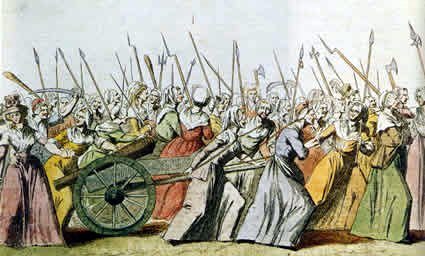
After the first decisions of the National Constituent Assembly during the summer of 1789, there was a fear for a reaction of the former privileged and the prices of basic products continued to be very high. On the 5th October 1789 a women´s protest for the high cost of living in Paris marketplaces became a political protest related to the revolutionary atmosphere in France. A group of around 6,000-10,000 people, commanded by women, ransacked the city armory, went to Versailles and once there they besieged the Royal Palace and asked for a meeting with the king. This event was called the Women´s March on Versailles. The deputies of the National Constituent Assembly received the protesters and intervened to get an interview of a committee of women with Louis XVI. The king received the women and promised to give them food. Part of the protesters came back to Paris, but another group continued in Versailles and on the 6th October at dawn some people stormed the palace. One of the protesters was killed by the royal guard and there were moments of extraordinary tension. The Marquis of Lafayette, head of the National Guard (Garde Nationale), convinced the crowd to keep calm and adviced the king to go back to Paris, as the protesters demanded. So the royal family and many of the members of the National Constituent Assembly went to Paris, escorted by a crowd of around 60,000 people. The royal family settled down at Tuileries Palace and the National Constituent Assembly started its meetings at a former riding school, la Salle du Manège. These events made Louis XVI aware of the fact that he was not an absolute monarch anymore and he was obliged to obey the people, although he tried to stop the decisions of the Assembly and later he looked for help to subvert revolution.
The Women´s March on Versailles shows that not only men were revolutionary. Although few women were politicized, many of them started being aware of their awful living conditions and decided to take part in the revolution to improve their lives. Some of them demanded equal rights to men, such as Théroigne de Méricourt, Claire Lacombe or Olympe de Gouges, the writer of the Declaration of the Rights of Woman and the Female Citizen in 1791.
No comments:
Post a Comment